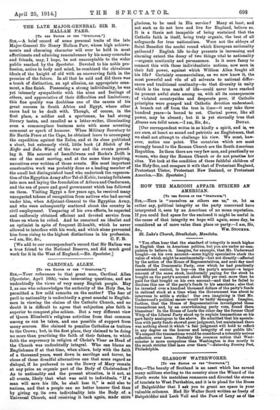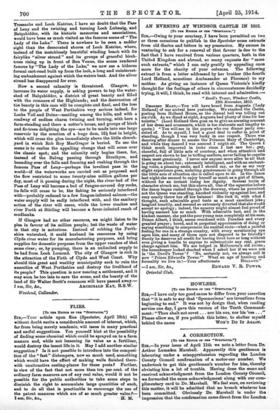GLASGOW WATERWORKS.
[To ran Eorroa or vs. "Srecraroa."]
Stn,—The beauty of Scotland is an asset which has earned many millions sterling to the country since the Wizard of the North wrote his matchless romances and directed the stream of tourists to West Perthshire, and it is to plead for the Braes of Balquhidder that I ask you to grant me space in your valuable columns. Had Sir Walter Scott written as freely of Balquhidder and Loch Vol and the Pass of Leny as of the Trossachs and Loch Katrine, I have no doubt that the Pass of Leny and the twisting and turning Loch Lnbnaig, and Balqulaidder, with its historic memories and associations, would have been as much visited as the famous scene of " The Lady of the Lake." There is nowhere to be seen a sadder sight than the desecrated shores of Loch Katrine, where, instead of the matchlessly beautiful winding beach with its fairylike "silver strand" and its groups of graceful birch- trees rising up in front of Ben Venue, the scene rendered famous by "The Lady of the Lake," we now see a hideous formal cart-road built up from the loch, a long and uninterest- ing embankment against which the waters beat. And the silver strand has disappeared for ever.
Now a second calamity is threatened. Glasgow, to increase its water supply, is asking powers to tap the water- shed of Baiquhidder, a district of great beauty and filled with the romance of the Highlands 4 and the destruction of the beauty in this case will be complete and final, and the loss to the people of West Perthshire very serious indeed, for Lochs Veil and Doine—nestling among the hills, and with a roadway of endless charm twining and turning, with here a farm-standing and there a cotter's house, and groups of birch and fir-trees delighting the eye—are to be made into one large reservoir by the erection of a huge dam, 54 feet in height, which will cross the glen immediately above the little church. yard in which Rob Roy MacGregor is buried. To see the scene is to realize the appalling change that will come over the classics spot; and the calamity only begins there, for, instead of the Balvag passing through Strathyre, and bounding over the falls and foaming and rushing through the famous Pass of Leny—perhaps the loveliest pass in the world—if the waterworks are carried out as proposed and the flow restricted to some twenty-nine million gallons per day, most of it passing during the night, the river-bed of the Pass of Leny will become a bed of fungus-covered dry rocks, its falls will cease to be, the fishing be seriously interfered with—probably reduced to a few fungus-infested salmon—the water supply will be sadly interfered with, and the sanitary action of the river will cease, while the lower reaches and river Forth at Stirling will become a fever-infested reach of mudbanks.
If Glasgow had no other resource, we might listen to its plea in favour of its million people; but the waste of water in that city is notorious. Instead of robbing the Perth- shire watershed, it could husband its resources by using Clyde river water for its manufacturing purposes, and bring supplies for domestic purposes from the upper reaches of that same river; or, by pumping, there is an unlimited supply to be had from Loch Lomond. The city of Glasgow is rich in the attraction of the Firth of Clyde and West Coast. Why should this great and wealthy municipality seek to rain the amenities of West Perthshire and destroy the livelihood of its people ? This question is now nearing a settlement, and it may soon be too late to save the scene, and the beauty of the land of Sir Walter Scott's romances will have passed away.—
Woodend, Callander.



























































 Previous page
Previous page